Iran's Navy Unveils 'Advanced' Cruise Missiles

Iran's Naval Forces introduced new cruise missiles on Sunday shortly after the US military blamed Iran for a drone attack on a vessel in the Indian Ocean.

Iran's Naval Forces introduced new cruise missiles on Sunday shortly after the US military blamed Iran for a drone attack on a vessel in the Indian Ocean.
US CENTCOM announced on Saturday that a drone launched from Iran targeted and hit a chemical tanker in the Indian Ocean, known as the Chem Pluto, the first time the US has directly blamed Iran for an attack as maritime routes have become a key strategy from Iran's proxies amidst the war in Gaza.
A fire onboard was successfully extinguished, and there were no casualties. Iran has not commented. It comes while its Yemeni proxy the Houthis have announced a blockade of the Red Sea, in allegiance with Iran-backed Hamas in its war against Israel.
According to the state news agency IRNA, the additions to the army's naval forces include strategic cruise missile systems named Talaiyeh and Nasir, along with some other drone systems and a submarine locator system.
During the unveiling ceremony, Shahram Irani, the commander of the naval forces, highlighted that the Talaiyeh sea cruise missile boasts a range exceeding 1,000 kilometers and operates intelligently throughout its flight. Additionally, Irani introduced the Nasir sea cruise missile, which boasts a range of over 100 kilometers and exhibits highly advanced capabilities in demolition operations.
Iran, possessing one of the largest missile programs in the Middle East, asserts that its missiles can reach Israel and US bases in the region. Despite opposition from the United States and European countries, Tehran has declared its intention to persist with the development of its “defensive” missile program.
Iran maintains that its ballistic missiles serve as a deterrent and retaliatory force against the United States, Israel, and other potential regional adversaries.
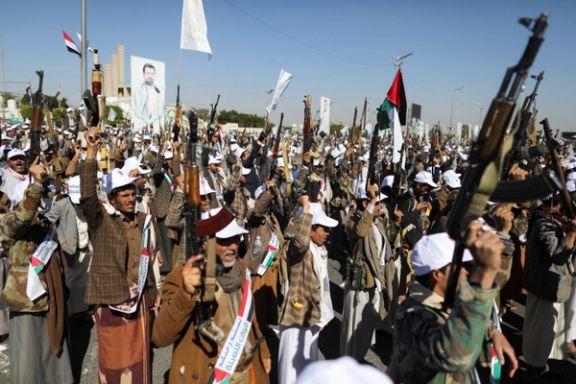
Yemen's Houthi Supreme Political Council has warned the US and Israel that they will face an "unpredicted" response if a direct attack is launched against them.
“If we are directly attacked by the US and Israel, they will face a response that they do not expect and predict,” Yasser al-Huri Secretary of Yemen's Supreme Political Council told Iran’s Official News Agency IRNA on Sunday.
"Battlefields will be expanded and methods of confrontation will be more varied", al-Huri added.
The Houthis in Yemen, who receive military assistance and weapons from Iran, began attacking commercial shipping in mid-November in response to the call of the Iranian Supreme Leader Ali Khamenei to block Israeli trade, but as the world's main oil route, it has garnered a global response.
The attacks have caused some shipping companies, including four of the largest five, to cease operations on this route for security reasons.
The US announced a coalition to safeguard commercial traffic in the Red Sea following the disruption in global maritime trade. As of Thursday, more than 20 countries have agreed to participate in the joint naval patrol near Yemen.
While the US has avoided pointing direct blame at Iran for regional tensions, instead focusing on its proxies, the Pentagon announced that the kamikaze drone that struck an oil tanker in the Indian Ocean early Saturday morning was launched directly from Iran.
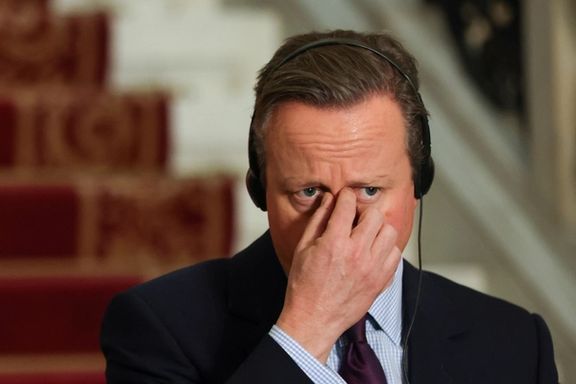
The UK foreign secretary summoned Iran's chargé d’affaires Friday, warning that Iran's "malign" activities will not be tolerated on UK soil or in the Middle East.
David Cameron's action followed revelations that the Iranian regime planned to assassinate two Iran International news presenters, Sima Sabet and Fardad Farahzad, in London last year.
The recently appointed foreign secretary said he wanted "to make it clear that these threats will not be tolerated", according to the Telegraph.
Over 15 Iranian threats and plots to kill British or UK-based individuals have been reported since the beginning of last year, according to government officials.
On Friday, England's Central Criminal Court sentenced a man arrested for gathering information about Iran International's London headquarters to three and a half years in prison.
Iran must be sent “an incredibly clear message that this escalation will not be tolerated,” Cameron said, citing “the threat of Iran” as one of five significant “crises” causing “extraordinarily difficult times for the world”, in addition to the Russia-Ukraine conflict, terrorism, and climate change.
The UK's tough stance follows a similar move by the US on Friday. In a clear statement, the White House stated that Iran is deeply involved in planning drone and missile attacks against commercial vessels in the Red Sea by providing intelligence to the Houthis which have blockaded the major trade route in allegiance with fellow Iran-backed militia, Hamas, in its war against Israel.
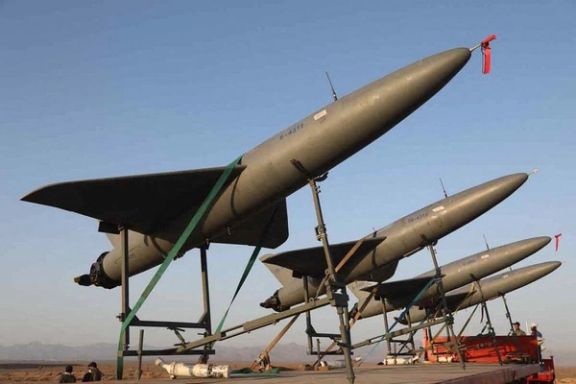
In a major development, the Pentagon said that the kamikaze drone which struck an oil tanker in the Indian Ocean early Saturday was launched directly from Iran.
The incident comes against a backdrop of Houthi attacks on commercial vessels in the Red Sea, and may suggest an escalation of regional tensions that began with the Hamas rampage of Israel on October 7 and the ensuing Israeli onslaught on Gaza.
So far, the maritime theater of conflict was confined to the Red Sea, with Iran-backed Houthis in Yemen the sole instigator.
One day before the Saturday attack, the US government accused Iran of being “deeply involved” in Houthi operations in the Red Sea. This is the first time in the recent conflict, however, that the Biden administration blames Iran for directly striking a vessel –and the first time such a strike takes place so far away from the Red Sea.
The tanker Chem Pluto was hit 200 nautical miles from the Indian coast, carrying oil from Saudi Arabia to India.
MV Cham Pluto is a Liberian-flagged, Japanese-owned vessel managed by the Netherlands’ Ace-Quantum Chemical Tankers, which is reportedly connected to the Israeli shipping tycoon Idan Ofer. And that may explain why it was selected as a target.
Some Iranian one-way “kamikaze” drones boast a range of “over 1,000 kilometers”. The one most publicized, perhaps, is Shahed 136 that has been used by Russia against Ukraine.
Iran has not yet reacted to the claim that it was behind the attack on Chem Pluto. But the regime officials have repeatedly denied involvement in the Houthi attacks.
“The resistance has its own tools of power and acts according to its decisions and capabilities,” Iran’s deputy foreign minister said Saturday in reaction to the White House claim that the regime in Tehran was "deeply involved" in planning the Houthi operations. Iran’s foreign minister repeated the counterclaim.
“We told the Americans that if we had a role, we would have declared it,” he said Saturday. “We do not have any proxy groups. These groups are real and act in line with their country's national security.”
The “kamikaze” attack on an oil tanker headed for India 200 miles off the Indian coast is a serious development, whoever the perpetrator. It could cause shipping insurance rates to go higher and ‘unsafe’ waters expand to the Indian Ocean and elsewhere, exacerbating the disruption caused by Houthi attacks in the Red Sea.
In an interview with the Telegraph on Saturday, the UK foreign secretary warned about dangers to “maritime freedom” caused by recent attacks. He said Iran must be sent “an incredibly clear message that this escalation will not be tolerated.”
Only hours earlier, the IRGC’s deputy commander had threatened that the Mediterranean Sea could be closed if the US and its allies continued to commit "crimes" in Gaza –without any suggestions as to how such a threat could be realized.
In the US, many critics of President Joe Biden say it is his reluctance to confront Iran that has emboldened the regime and its proxies in the region.
“Iran proxies, the Houthi rebels, are small in number but have all but stalled commerce in the Red Sea while we do nothing to stop them,” said former US national security advisor John Bolton on Saturday. “The mullahs in Tehran will not cooperate with our government no matter how hard Biden and Obama-era officials blindly push a return to the flawed 2015 nuclear deal to appease them.”
Congressman Mike Collins seconded the critique.
“Iran can strike civilian ships and the Biden administration will do nothing in return. Deterrence is dead,” he posted on X Saturday evening.
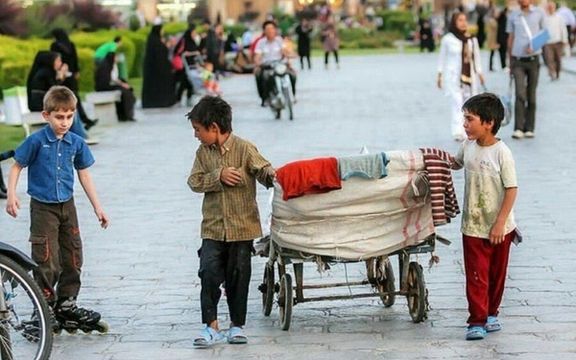
The CEO of the Association for the Support of Children has raised alarm over the deteriorating conditions for working children in Iran.
Noting that observations on the streets indicate a worsening situation, Tahereh Pazhouhesh emphasized that the age of child labor in Iran has now reached as low as seven years.
In a recent interview with Faraz Daily, she expressed concern that all activities related to child labor are being carried out in a negligent manner without proper supervision.
Criticizing the lack of expertise and awareness among city officials regarding children, she highlighted that, "Until specific budgetary resources are allocated for children, no changes will occur in the conditions of child labor."
In centers previously under the supervision of the Welfare Organization, Pazhouhesh disclosed that they used to care for child laborers. However, due to insufficient capacity, the government was ultimately compelled to release the children after just one week.
Meanwhile, Alireza Zakani, the Mayor of Tehran, asserted on Saturday that issues related to drug addiction and child labor would be resolved by the end of the Iranian year (March 20).
Zakani claimed that a special plan would be implemented to ensure that the face of Tehran is "completely clean" of the challenges posed by drug addiction and child labor before the Persian New Year, Nowruz.
However, Zakani's statements have triggered a wave of negative reactions from activists and social media users. Activists pointed out that child laborers are exposed to harassment and sexual abuse. Some social media users also attributed the growth of child labor, drug addiction, and homelessness to the policies of the Islamic Republic over the past four decades.
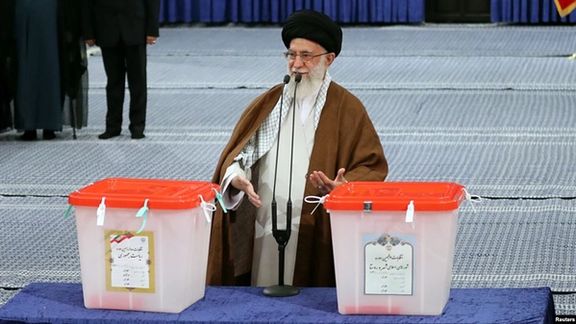
Insisting that there would be “dictatorship” in the absence of elections, Iran's Supreme Leader Saturday urged Iranians to vote in the March parliamentary elections.
Khamenei who was addressing a group of visitors from Kerman and Khuzestan provinces emphasized that the solution to the problems that Iran and Iranians are facing is participation in the elections, blaming the opposition for discouraging people from voting.
"Some people constantly remind about the country's problems to discourage people, but the solution to these problems is elections, and to solve the problems, one should participate in the elections," he said.
In his speech however, Khamenei made no mention of the actual problems highlighted by the opposition, including a serious economic crisis, rising poverty and extensive fresh corruption cases. Most notably, the 83-year-old authoritarian ruler failed to mention the controversial candidate vetting process that has consistently narrowed the circle of regime insiders in recent years, leaving most political parties and groups with no viable candidates.
Khamenei has been Supreme Leader since 1989, increasingly building his authoritarian rule, without having to get re-elected and not subject to any supervision.
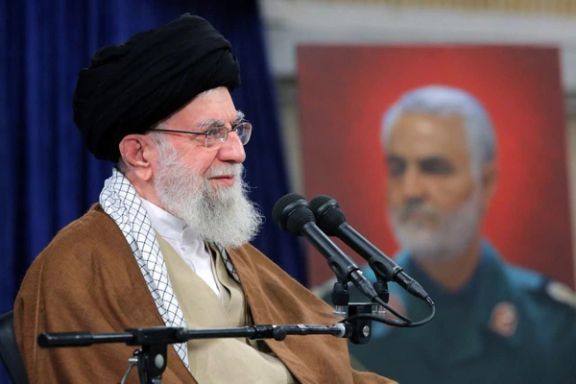
"Elections are the basis of transformation. Elections prevent dictatorship, chaos, insecurity, and turbulence," he said to persuade the largely indifferent public to go to the ballot boxes.
In the jargon of the officials, including Khamenei, the word translated as turbulence, eqteshash, is always used instead of ‘protest’ when referring to anti-government manifestations.
People not loyal to the Islamic Republic were never allowed to have any political activity and have been always persecuted, but many of those who accepted the regime and even held positions in the government have been purged in the past 15 years.
Convinced that hardliners committed to Khamenei’s policies will cruise to victory with the help of the Guardian Council, which has barred most other insiders, most Iranians are showing very little interest in the upcoming elections. In addition to electing a new parliament, the March 1 vote will also select the eighty-eight clerics of the Assembly of Experts that must choose Khamenei’s successor.
Most Reformist parties and groups, as well as many among moderate conservatives, have not shown any interest in the elections given extensive candidate disqualification in the 2020 parliamentary vote, which excluded them and resulted in domination by ultra-hardliners. Many among the opposition abroad and other inside Iran staunchly oppose participation in any of the elections that the Islamic Republic holds on the grounds that voting in these circumstances would only give the regime a semblance of legitimacy.
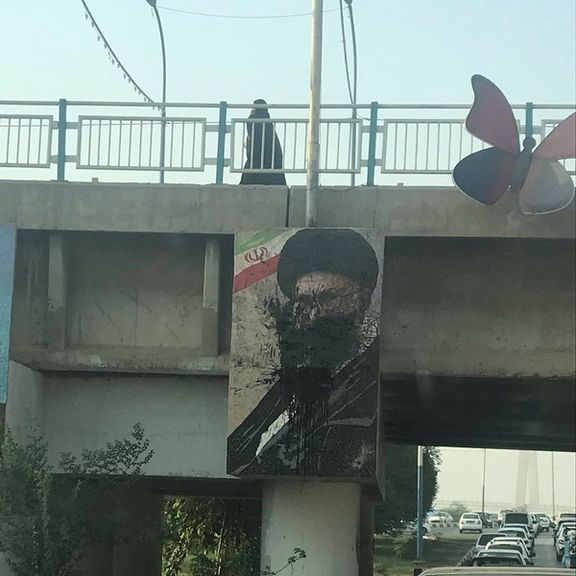
Based on recent polls, pundits including former Reformist politician, commentator and sociologist Abbas Abdi say turnout may be the lowest in the four-decade history of the Islamic Republic. According to Abdi, less than 10 percent of the educated urban young people intend to vote and predicted that overall turnout in the capital Tehran may even be under 15 percent.
A poll recently conducted by the semi-official Iranian Students Polling Agency (ISPA), found 27.9 percent of those polled saying they would definitely vote against 36 percent who said they would not under any circumstances. 21.9 percent said they had made no decision yet.
“To what extent people hope to solve their problems through elections plays a major role in their participation,” Abdi wrote in November.
Former government spokesman, Reformist politician and sociologist Ali Rabiei has predicted that contrary to the previous elections, when interest in voting increased as voting day approached, there will be no increased interest this time. He has also predicted a turnout of around 32 percent in the country and less than half of that in Tehran.
In 2020, the Khamenei-appointed Guardian Council ensured that not only Reformists closer to conservatives, but also most moderate conservatives were excluded from the electoral lists. The vetting and low turnout resulted in the dominance of hardliners and ultra-hardliners in the current parliament.
Voter turnout in the 2020 parliamentary elections officially dropped to 42 percent, the lowest since the first elections held in 1979, only two months after the Islamic Revolution, in which 52 percent of those eligible to vote had taken part. Some critics say that even the official turnout numbers are exaggerated, and far fewer people cast ballots.
The highest turnout in the parliamentary elections was registered in 2001, during the presidency of Reformist Mohammad Khatami, when 67 percent of eligible voters went to the polls. This was one of the rare occasions when the Guardian Council allowed candidates from across the political spectrum loyal to the regime to run. Reformists gained an overwhelming majority in the 2001 elections.